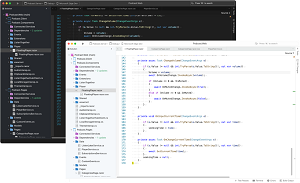News
Microsoft Kills Visual Studio for Mac
Microsoft is retiring Visual Studio for Mac after a years-long effort to get the IDE up to par with the Windows version.
Development problems caused VS 2022 for Mac to debut about six months after that Windows version last year after the team tried to address performance and reliability issues dating back to 2018 with revamps of the frontend UI and backend runtime. Various problems prompted the team to replace the IDE's editor internals with Visual Studio for Windows code and dump the Mono runtime for .NET 6 early last year.
Finally, today Microsoft threw in the towel, switching its Mac ambitions to VS Code and other alternatives.
"With today's announcement, we're redirecting our resources and focus to enhance Visual Studio and VS Code, optimizing them for cross-platform development," Microsoft said. "No new framework, runtime, or language support will be added to Visual Studio for Mac. For the next 12 months, however, we will continue providing essential updates such as servicing updates for critical bug fixes, security issues, and updated platforms from Apple."
 [Click on image for larger view.] Visual Studio 2022 for Mac v17.0 (source: Microsoft).
[Click on image for larger view.] Visual Studio 2022 for Mac v17.0 (source: Microsoft).
Support will officially end in one year, on Aug. 31, 2024.
"We will also continue to provide runtime and workload updates so you can continue building and shipping applications built on .NET 6, .NET 7, and the Mono frameworks," Microsoft said. "While not officially supported, we've also enabled rudimentary support for .NET 8 in Visual Studio for Mac for building and debugging applications. We hope with these commitments and the investment in the alternatives below, we can minimize the disruption to your workflow on the Mac."
The company proposed the following alternatives to VS for Mac:
- Visual Studio Code with the new C# Dev Kit and related extensions: The recently announced C# Dev Kit, .NET MAUI, and Unity Extensions for VS Code are available in preview and are intended to augment VS Code's capabilities for .NET and C# developers. These extensions operate natively across all supported platforms, including macOS, and the experience using these will continue to be improved as they move from preview to GA and beyond.
- Visual Studio IDE running on Windows in a VM on Mac: This option will cover the broadest IDE needs such as legacy project support for Xamarin, F#, and remote development experiences on iOS by using a virtual machine (VM).
- Visual Studio IDE running on Windows in a VM in the Cloud: Visual Studio continues to be the premier tool of choice for .NET/C# development. A Cloud hosted VM from Microsoft Dev Box provides access to the full power of VS through your Web or native RDP client from a Mac without the overhead of running a virtual machine on your local machine.
Some initial comments on the post expressed dismay:
- What a slap in the face to mac developers, we already were getting shafted not having full VS and now we don't get an IDE period.
- Instead of giving us a full fledged IDE they decided to put in half the effort then give up entirely. Absolutely shameful.
- This is pretty lame. "Here Mac users! We have a new update of Visual Studio! It's it awesome!. PSYCHE! Fool you!"
The move is also being discussed on Hacker News with early comments including:
- Microsoft would never say it, of course, but truly the best “alternative solution” is Jetbrains Rider. It's head and shoulders above VS for Mac in every way. I learn more C# features through its recommendations than even reading Microsoft's development docs.
- This is only 2 years after it announced they're moving to a native macOS UI: https://devblogs.microsoft.com/visualstudio/visual-studio-20...
- This is sad but unsurprising. Microsoft did so well purchasing Xamarin and then systematically ripped it apart and didn't bother to put any effort behind VS Mac. Then it did early this year and then just gave up.
Microsoft, however, is moving on.
"Informed by ongoing user feedback and usage patterns for Visual Studio for Mac, we're focusing our efforts on optimizing Visual Studio, accessible through the C# Dev Kit for VS Code, which is accessible on any OS and Microsoft Dev Box also on any operating system."
About the Author
David Ramel is an editor and writer at Converge 360.